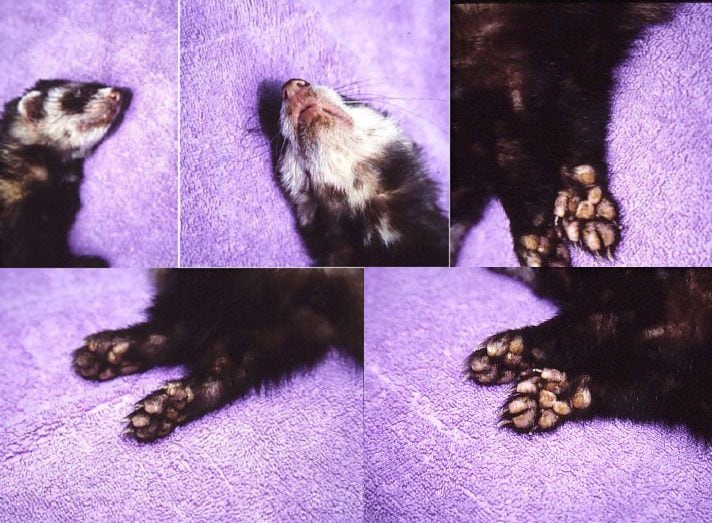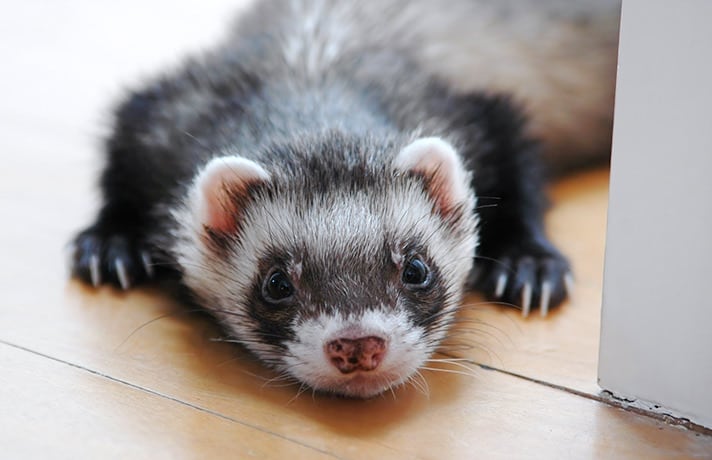Ferrets are highly intelligent animals with the ability to be trained and to learn new tricks. Just like cats and dogs, ferrets can be housebroken. And that’s good news for two reasons:
- A litter-trained ferret can spend more free time outside of her cage, which means more opportunities for enrichment and more time spent together.
- You won’t have to worry as much about cleaning up accidents.
You can start training your ferret as soon as you bring her home for the first time. Starting good habits while your ferret is still young can help her learn faster, though you can also teach your ferret to use litter as an adult.
Ferret Supplies for Litter Box Training
To litter train a ferret, you need the following ferret supplies:
- Several litter boxes
- Ferret-safe litter
- Treats
- An extra helping of patience
It’s not a fast process, but it will be very rewarding, not to mention impressive, to finally have a ferret with good potty manners.
Litter Box
Dr. Elizabeth Kamaka, DVM, of Kamaka Exotic Animal Veterinary Services in Mountlake Terrace, Washington, recommends using a square litter pan with a high back, like the Marshall Ferret Litter Pan, which can lock onto the side of your ferret’s cage or be removed and placed around your home. Your ferret should be able to step into their litter box, turn around and back into the corner without pooping over the side.
You will need multiple litter boxes to increase the chances that your ferret will relieve herself in the correct spot, especially when you first begin training.
“For the best set up, place a litter box in every corner in the cage or room while training, then reduce the number of boxes to the corner(s) most frequently used,” Dr. Kamaka says. “Cardboard boxes can also be placed around the home if the ferret is allowed to free roam, under supervision.”
Litter
When it comes to litter, make sure you are choosing one that is safe for ferrets. Ferrets tend to dig around in their litter, sometimes with their nose, so a litter that generates dust can irritate the lining of their respiratory system. Marshall Premium Odor Control Ferret Litter is a good choice, though any paper or pine-based, non-clumping, unscented cat litter will also work.
Ferret Treats
Give your ferret a delicious treat as a reward every time she uses the litter box. Marshall Bandits Freeze Dried Duck Treats are healthy and bite-size, perfect for using as a training reward.
“Most young ferrets younger than 6 months won’t recognize food treats, but Bandits will work with older ferrets,” Dr. Kamaka says.
Training Ferrets to Use the Litter Box
Ferrets need to use the bathroom many times throughout the day. If you watch carefully, you may start to notice your ferret’s toilet habits, so you can predict when they need to go. They may need to go in the morning when they wake up, for example. At those times, and regularly throughout the day, place your ferret in the litter box.
“When your ferret is out playing, start with a small play area with multiple [litter] boxes [nearby]. Keep a close eye on them and put them into the litter box when they start to back up to defecate,” Dr. Kamaka says. “Sometimes a ferret will ‘fake it.’ Don’t let them out of the box or keep putting them into the box until they actually defecate. Consistency is the key!”
Every time you catch your ferret successfully using the litter box, be sure to praise her and offer up a tasty treat.
Accidents Will Happen
If your ferret goes potty outside the litter box, clean up the soiled area immediately. If you don’t, your ferret may seek out the lingering scent and have an accident in the same spot. To encourage your ferret to use the litter box next time, pick up any feces and soak up her urine with a paper towel to place in the litter box. This will add your ferret’s scent to her litter box so she is more inclined to use it later.
Dr. Kamaka’s biggest tip is to be watchful and consistent. Always put your ferret in her litter box when she show signs that she is about to go potty, like sniffing around or starting to back up into a corner.
If your ferret fails to use the litter box, there is no need to punish her. Ferrets as pets do not respond well to reprimanding. Any negative reaction, even a verbal scolding, could stress your ferret without helping them understand what they have done wrong and may only lead to more accidents.
Keep in mind that you will most likely have to clean up many accidents before your ferret is litter trained, so it’s best to stay patient.
“Every ferret is unique in their potty training timeline,” Dr. Kamaka says. “Just keep putting them back in the box.”
Even when trained, ferrets will not become 100-percent reliable at using their box, so you will have to clean up the occasional accident when they are playing outside of their cage.
![]()
Lindsay Pevny is on a mission to gather science-based information on pet care, training and products, and to use her writing to help other dog parents make informed decisions for their four-legged family members. As a pet copywriter, she works with passionate pet business owners to spread the word about their innovative pet products and services. Get to know her doggy muses, Matilda and Cow, on her personal blog, Little Dog Tips.
Share:













